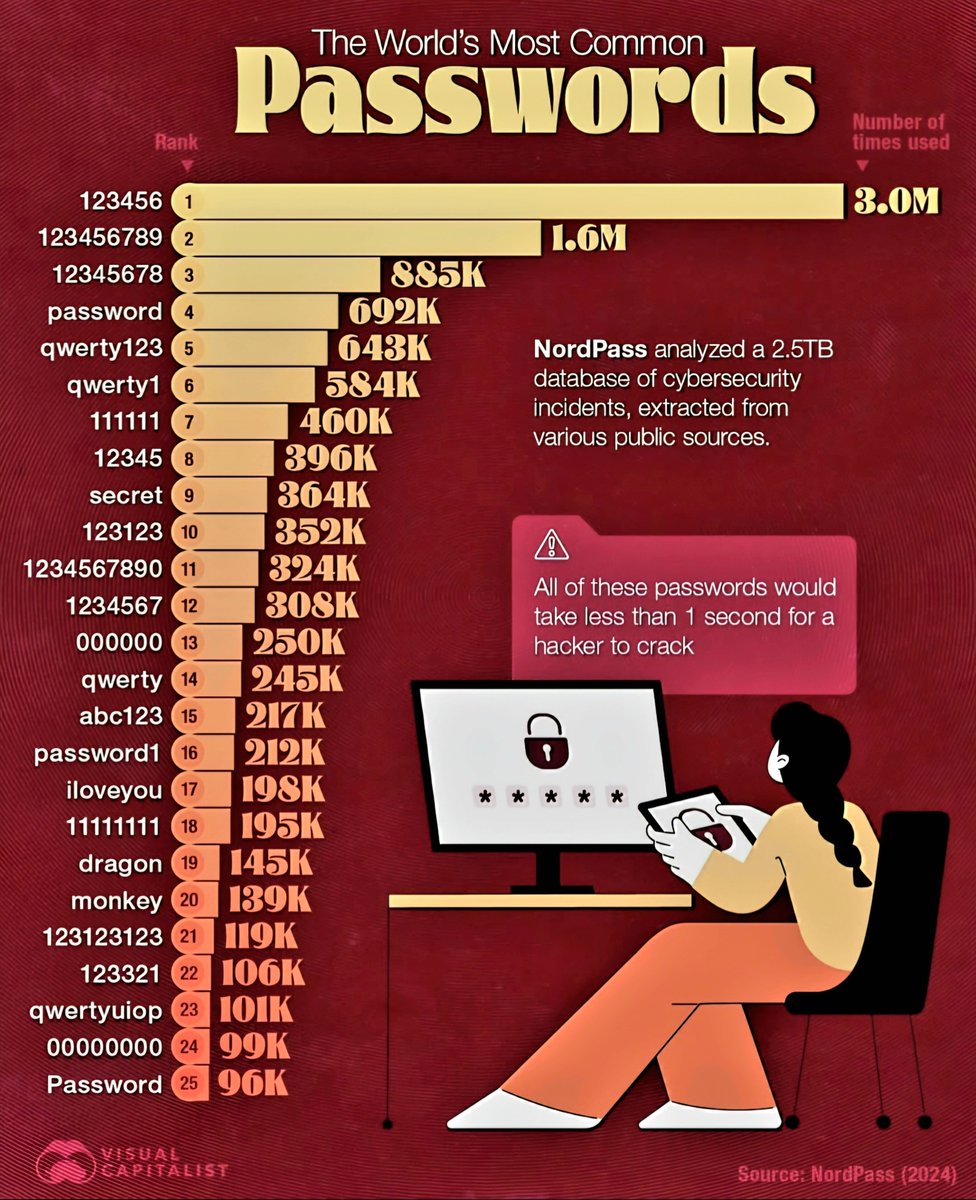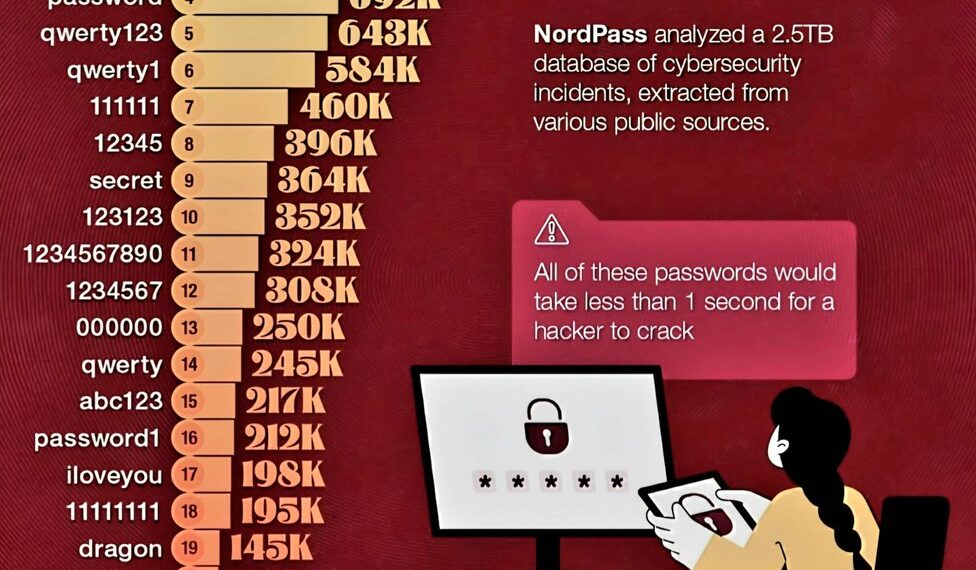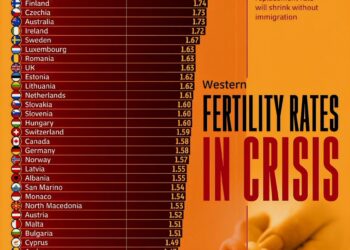Select Language:
25 Most Used Passwords of 2024 – A Cybersecurity Wake-Up Call
In an age where online security is paramount, a recent analysis by NordPass has revealed the 25 most common passwords currently in circulation. These passwords highlight alarming trends in user security habits, indicating that many individuals are still not taking adequate measures to protect their online accounts. The database analyzed was an extensive 2.5TB collection of cybersecurity incidents acquired from various public sources. Here’s a rundown of those passwords and what they signify for online security.
1. 123456 – 3.0M
Imagine a password that takes just a moment to guess. “123456” tops the list with an astonishing 3 million users. Its simplicity makes it a prime target for attackers.
2. 123456789 – 1.6M
Following closely behind, “123456789” has been adopted by 1.6 million users. The numeric sequence remains among the weakest choices available for securing any online account.
3. 12345678 – 885K
Ranked third, this variation of the previous passwords is used by 885,000 individuals. It’s clear that users often rely on sequential numbers rather than complex, unique passwords.
4. password – 692K
Surprisingly, “password” remains a common choice, with 692,000 users opting for this utterly predictable option. This underscores how many people overlook basic security practices.
5. qwerty123 – 643K
The prevalence of keyboard sequences is evident in “qwerty123,” which is used by 643,000 people. This choice reflects a lack of creativity in password selection.
6. qwerty1 – 584K
Similar to “qwerty123,” this variant is used by 584,000 individuals, further illustrating the trend of sticking to simple keyboard-based passwords.
7. 111111 – 460K
Repetitive numbers reappear with “111111,” chosen by 460,000 users. Its simplicity makes it easy to guess, an attractive aspect for those looking for a quick input.
8. 12345 – 396K
Another simple sequence, “12345,” has drawn in 396,000 users. This choice suggests a general disregard for secure password creation.
9. secret – 364K
“Secret” may sound intriguing, but it is still a prevalent choice for 364,000 individuals. This highlights a misunderstanding of what constitutes a secure password.
10. 123123 – 352K
This pattern is used by 352,000 users. Like many sequential numbers, it lacks uniqueness and complexity.
11. 1234567890 – 324K
Even longer numeric entries, like “1234567890,” have made the list with 324,000 users. Still, it remains insecure against trained attackers.
12. 1234567 – 308K
Going back to shorter sequences, “1234567” has 308,000 takers. Clearly, many users opt for ease over security.
13. 000000 – 250K
The use of repeated zeros is associated with 250,000 accounts. It’s a stark reminder of how many people choose easily guessable passwords.
14. qwerty – 245K
As a standalone keyboard entry, “qwerty” attracts 245,000 users, continuing the trend of low-security passwords.
15. abc123 – 217K
The combination of letters and numbers in “abc123” has been selected by 217,000 individuals, showcasing a failure to recognize the importance of password complexity.
16. password1 – 212K
A slight alteration to the basic “password,” this choice is used by 212,000 users, emphasizing an alarming pattern in password selection.
17. iloveyou – 198K
While sentimental, “iloveyou” is used by many (198,000), making it an easy target for hackers familiar with common phrases.
18. 11111111 – 195K
An extension of “111111,” this variation has 195,000 users who are overlooking security in favor of convenience.
19. dragon – 145K
“Dragon” has attracted 145,000 users, showing how even common words can be poor choices as passwords.
20. monkey – 139K
Like “dragon,” “monkey” is a popular word that has managed to ensnare 139,000 users into the web of weak passwords.
21. 123123123 – 119K
Following the trend of repetitive numbering, “123123123” is claimed by 119,000 users, indicating a dire need for better practices.
22. 123321 – 106K
This palindromic number is chosen by 106,000 individuals, further showcasing a lack of creativity.
23. qwertyuiop – 101K
A longer keyboard sequence, “qwertyuiop” captures 101,000 users, further illustrating the comfort many feel with sequential passwords.
24. 00000000 – 99K
This variant of zeros appeals to 99,000 individuals, adding to the troubling trends in password security.
25. Password – 96K
Finally, the capitalized form “Password” rounds out the list with 96,000 users. This capitalized approach does little to improve the security of an inherently weak password.
Conclusion
The findings by NordPass highlight a critical issue in online security: the majority of people continue to rely on easily guessed passwords. All of these passwords can be cracked in under one second, presenting a significant risk to the security of personal and professional accounts. The data serves as a wake-up call for individuals to adopt more robust password practices, utilize password managers, and consider multi-factor authentication to enhance their online security.








